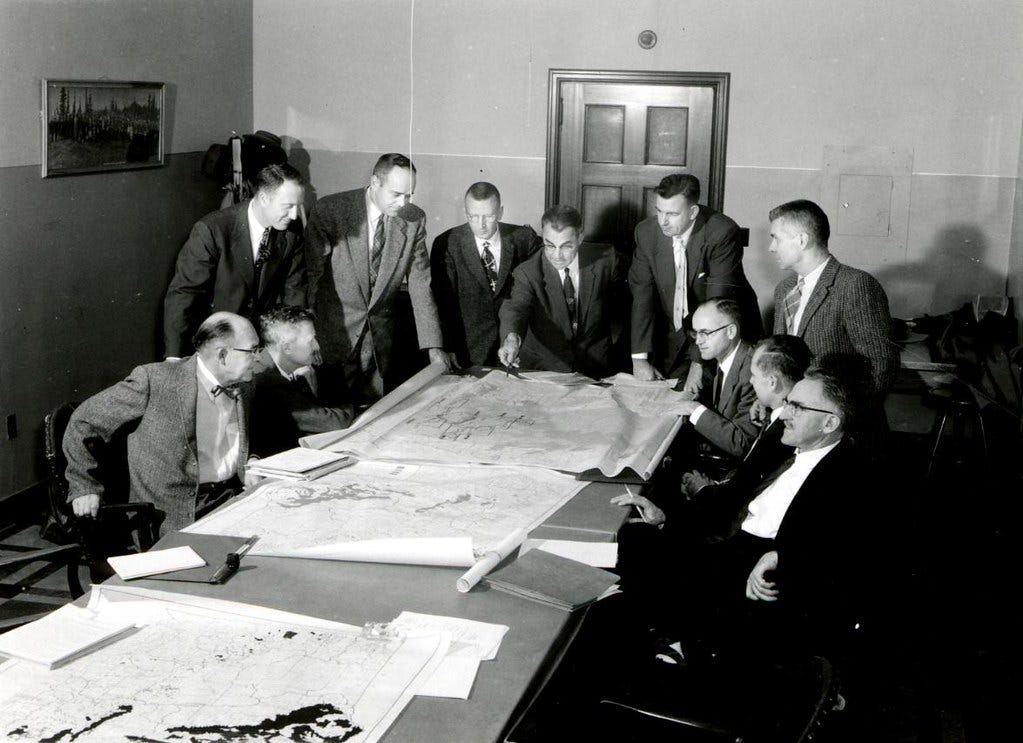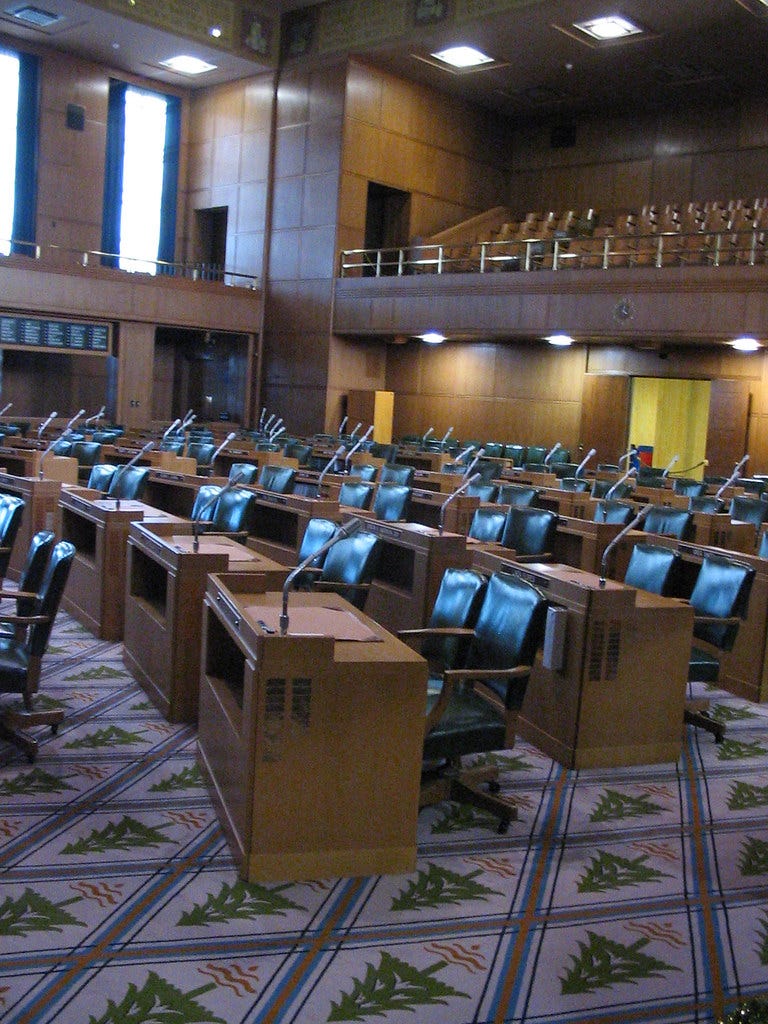Rich Vial: Escaping the pull of partisan politics
My confidence in the goodness of people remains, but my observation of how partisan control can shape abuse of power has profoundly altered my view on the necessity of reformatting our rules.
Rich Vial is a former Oregon State Legislator, former Deputy Secretary of State and founder of the law firm Vial-Fotheringham, LLC. He provided legal assistance to hundreds of Homeowner Associations throughout the West for four decades and has always had a passion for how communities organize and govern effectively.
Building a better Oregon

By 2016, after nearly 40 years of participation on various boards and commissions, I had come to expect two things of people active in public affairs: first, that they are well intentioned and, second, that they are truly interested in working for the public good, even if that public good is viewed through the lens of a personal agenda. My time as a Homeowner Association attorney revealed that these expectations generally hold true even at the most basic and local levels of democracy.
HOAs, like the small New England towns that got our democracy started, depend on cooperation between and communication with neighbors. Though things like Roberts’ Rules and other democratic processes on display at HOA meetings can be messy, they have always proven to be better than any alternative. This fact wasn’t always easy to see. I admit that I saw many exceptions to good faith participation in democratic practices, but through all of these experiences I did not lose my honest confidence in the goodness of people and our ability to work together despite differences.

"1958. Northwest Forest Pest Action Council with aerial survey maps. Portland, Oregon." by USDA Forest Service is marked with CC PDM 1.0
My belief in democracy functioning thanks to the good faith participation of community members sparked my interest in public service. Perhaps that’s why I have always been interested in participating in the State Legislature. I had plenty of experience in democracy at the local level. And, rather than be dissuaded from further participation, my time as chair of the local planning commission convinced me that good faith participation can lead to results. I enjoyed working with commissioners to identify common ground on many issues that encouraged responsible development of our community.
So, when the chance to participate at a higher level and to solve even bigger problems presented itself, I threw my hat in the ring and ran for an open seat in the Oregon legislature. While I had been elected to the local school board in the past, this was my first run for the State Legislature. I thought decades of public service had prepared me for another election. I was wrong. I knew there’d be some party politics involved, but I did not anticipate the tornado-like pull of partisanship.
The twisting winds of political parties
I grew up in Southern Oregon. Three decades of living in Washington County has not removed the core political values instilled at a young age: a bias toward limited government, self-reliance and individual freedom. My values, not my party affiliation, have always guided my politics. I had voted for many Democrats over the years, but, nevertheless, generally saw myself as a Republican and ran as such. However, as I was not the choice of the party for my seat; the primary turned out to be the most difficult part of the process. The demands of the party for loyalty were more or less absolute, and I simply could not align myself fully with the leadership, especially when it came to campaign tactics, and exploiting the weaknesses of my opponent. Still, I got elected, and was on my way to Salem.
My hope was that the strong winds of party influence would be confined to elections. But within a few days of spending time in Salem, it was impossible not to detect the pull of parties pervading virtually every important policy decision. Though my personal agenda was traffic, I was already feeling like I wanted to make a difference in the culture of the legislature upon arrival. In the days leading up to our opening session, I enjoyed training with the other “freshman” legislators, and often found common ground with members from both political parties. My observation was that these were mostly thoughtful, intelligent and well-intentioned people who honestly wanted to make a positive difference in their communities.

"The Oregon House of Representatives" by functoruser is licensed under CC BY-SA 2.0
On the first day in “session”, we met as we would virtually every day thereafter with our respective “caucuses” for about an hour before going to the “floor” to debate and vote. At that first day in caucus we discussed who would be elected as the House Speaker. It was clear that as the minority caucus we would have no part to play in that decision, and so we concentrated instead on the rules of the session. One of those rules dealt with the appointment of members to various committees. Our caucus leaders had decided that the practice of giving the Speaker sole authority to decide who served on what committee didn’t give the minority an appropriate amount of influence, and that a rule change would be proposed to allow the minority to choose where it’s members served. Made sense to me. Why wouldn’t providing strong and knowledgeable voices on both sides of an issue in committee lead to better laws?
When we got to the floor and began the process of electing officers and adopting rules, I looked around and greeted my fellow legislators across the aisle. We exchanged pleasantries, talked about how different and exciting this day was for us and jointly looked forward to being a part of something important.
Electing officers went as expected, with the majority having decided who would be serving in the various offices that ran the body. Since it would have done no good, there was no discussion, and we simply went through the motions. When it came time to discuss the rules however, the member of our minority caucus who had been selected stood up and moved for an amendment allowing minority participation in selection of committee members. This former radio personality, with his deep resonant voice, argued eloquently for the opportunity of the minority to strengthen their voice in the process with the change requested.
As he spoke, I looked at each of the freshman I had gotten to know across the aisle. Each of them was listening intently. I could tell by their expressions that they understood and, in many cases, agreed with the principle of making the process fairer for the minority. I began to hope that this would be a “win” for our side, and a change to make the entire process and culture of the legislature more collegial and collaborative.
It was at that moment that the winds of partisanship blew away any hope of compromise. As our representative wound down, I noticed a veteran legislator – a man I knew and later realized was the caucus “whip” – going from person to person among the freshman in the majority caucus. He channeled the partisan winds into individual gusts of direction. One by one, he would lean in, whisper in their ear, and make a note in the book he was carrying. In the end, the vote on this rule change was absolutely down party lines, with not a single person breaking rank. It was at that moment that I realized just what power the caucus leadership had and how naïve I was to hope for genuine deliberation and thought in the legislative process.
The reality is that essentially two people control the legislative agenda, and make the decisions for Oregon: the Senate President and the Speaker of the House. No bill gets a committee hearing without the leaders’ consent. No bill gets to the floor without the leaders’ consent. Like a tornado, once they set their course, there’s little that can stop them. They act like a force of nature – unrestrained by what their members want and surely what the people deserve. That isn’t right.

"Tornado" by Frank Peters is licensed under CC BY-NC-ND 2.0
What is the job of the caucus leaders? Without question, it is to get members of their party elected. Virtually all decisions about what bills to introduce, what bills to hear, and how bills will be processed and decided turn on the question of what difference it will make in the next election.
I know that politics is inseparable from democratic governance, but partisanship doesn’t have to be. Even well meaning attempts to increase accountability has had negative effects and, sadly, some of these policies seem to be fueling the tornado. Oregon’s Constitution requires legislator’s votes to be cast in public. This transparency is laudable, but when it comes to voting for leadership, not without its problems. As the saying goes, if you are going to depose the sovereign, you better be successful. No one dares vote against the caucus-determined leadership, lest they be punished with irrelevance in the legislature and defeat in the next election. The ability to select leadership without the potential for either reward or punishment by allowing secret ballot’s for legislative leaders should be as sacred as the secret ballot when we cast our votes as citizens. In my opinion the interpretation of our Constitution that has kept this from happening in our legislature is simply wrong.
Our system was originally set up so that committees could be the place where the long form conversation took place and complex matters got threshed out. No more. The tornado of party politics has no regard for the process if the process doesn’t serve the party. Committee chairs and indeed membership is now the sole prerogative of the majority leadership, and hearings are often a sham bit of theatre orchestrated to make sure that only a select group are given the time for testimony. Any semblance of true citizen participation has all but disappeared.
Seeking shelter in the storm: potential reforms
It doesn’t have to be this way. Oregon has a history of groundbreaking leadership in progressive change. I know that the term “progressive” is seen as negative by many on the “right”, but if we don’t progress at this moment, the alternative of increasing damage to our democracy is the inevitable result. The bottom line is that it is time to change our way of governing from a sport where two teams seek to destroy the other, back to a cooperative engagement that allows for disagreement to occur and ultimately leads to compromise and resolution of very difficult questions. We need to help legislators get out of their partisan bunkers and endow them with the freedom to make decisions for their constituents, not their leadership.
It is time for all of us to abandon the belief that if we just argue hard enough or become good enough at pointing out the weakness of our political opponents that the good we all want to do in the world will get done. It just doesn’t work that way. It is time to listen to George Washington and other Founding Fathers. We should follow their guidance and eschew the system that perpetuates the party rancor that threatens to divide us to the point of destruction.
Open Primaries, No Partisan Labels on Legislators, Secret Ballots for Legislative Leaders, Multi-Representative Districts, Ranked Choice Voting, etc. Any one of these could put us on the path back to political sanity. Eventually, with a system made up of these features, Oregon could indeed help our nation on a path that keeps us from experiencing a failed democracy.
My confidence in the goodness of people remains, but my observation of how partisan control can shape abuse of power has profoundly altered my view on the necessity of reformatting our rules to create a system that will allow us to unite in our efforts to govern ourselves with peace, harmony and a sense of security for all.
Keep the conversation going via Facebook (facebook.com/oregonway) and Twitter (@the_oregon_way)



